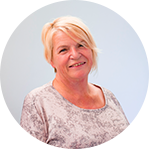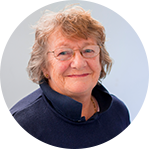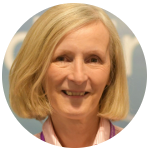
Our team
Professor Dame Robina Shah DBE
Director of the Doubleday Centre for Patient Experience, Professor of Psycho-social Medicine and Medical Education.
Robina is a Chartered Consultant Psychologist and Professor of Psycho-social Medicine and Medical Education in the Division of Medical Education at The University of Manchester Medical School.
She is the lead academic on person-centred education, patient safety, patient, and public involvement in the Division of Medical Education.
Robina is passionate about giving patients, carers and families a voice through active partnership. She is also a powerful advocate of psychosocial medicine and committed to patient and public involvement.
Over two decades, Robina has shared her teaching expertise in this area to challenge the focus of medical education from a biomedical model of disease to one that accommodates the psychological, social, and behavioural dimensions of illness.
As an academic psychologist with a lead role in promoting person-centred education, she values the contribution that patients, carers, and service users have made to student learning through their lived experience.
As the academic lead for patient and public involvement, Robina is committed to nurturing, developing and sustaining a vision and strategy that is owned, valued, and co-designed with the involvement of patients, the public, and professional colleagues.
Read more about Robina in the October 2020 issue of The Psychologist.
Karen Cotterill
 Centre Administrator
Centre Administrator
Karen is the Administrator for the Doubleday Centre. She is also a Personal Assistant to the Senior Leadership Team at the Division of Medical Education.
Karen manages all of the administration for the Centre, including organising public events such as the annual Doubleday Lecture, and day-to-day contact with MEPS.
Karen joined the University in 2015 after spending most of her career in human resources within the legal sector.
Karen particularly enjoys meeting the MEPs and hearing how they are enjoying their experiences when representing the Doubleday Centre.
National Ambassadors
Dame Philippa Russell
 As the parent of a disabled son and the founder, then director, of the Council for Disabled Children, Philippa has had a life-long commitment to improving outcomes for patients, for families and disabled people.
As the parent of a disabled son and the founder, then director, of the Council for Disabled Children, Philippa has had a life-long commitment to improving outcomes for patients, for families and disabled people.
As a Commissioner with the Disability Rights Commission throughout its life, she led its formal investigation into health inequalities as experienced by people with learning disabilities and mental health problems.
In this role, she was very aware of the need to encourage and enable people using health and care services and their families to use their lived experience to improve the quality of care and outcomes for all concerned.
As an Honorary Fellow of both the Royal College of Paediatrics and Child Health and the Royal College of Psychiatrists, Philippa has an ongoing interest both in achieving parity of esteem between physical and mental health and in developing and improving working partnerships with patients and the family carers who support them.
With reference to family carers, whose role is vital to the wellbeing and, in many cases, the good recovery of patients, Philippa also chaired the government’s Standing Commission on Carers for six years.
She is Vice-President of Carers UK and a Board member of the Think Local, Act Personal Partnership, which is committed to identifying and developing integrated partnerships working between health, social care and the patients, carers and local citizens who are increasingly co-designing and co-producing new patterns of services.
Philippa has become involved with the Centre because, as the parent of a son with learning and a range of health difficulties and a grandson with autism and a rare auto-immune disease, she is keenly aware of the importance (and potential) of building patient and family experience into the new agenda of shared expertise and dynamic partnerships as set out in the NHS England Five Year Forward View.
She is particularly excited by the Centre’s potential to contribute to the transformative Greater Manchester Devolution Programme, which will model the co-design and co-production of public and community services in partnership with the people who use them, their families and carers.
Sylvia Lancaster
 Sylvia Lancaster, an experienced youth worker, established the Sophie Lancaster Foundation Charity following the murder of her ‘goth’ daughter Sophie in 2007.
Sylvia Lancaster, an experienced youth worker, established the Sophie Lancaster Foundation Charity following the murder of her ‘goth’ daughter Sophie in 2007.
The charity’s aims are to create a lasting legacy to Sophie through education and campaigning for UK hate crime legislation to include alternative subcultures. It works in secondary and primary schools, colleges, prisons and with young offenders, challenging the often violent prejudice towards people from alternative subcultures.
Sylvia is also a member of the UK Government Cross Party Hate Crime Advisory Board. She works closely with police authorities throughout the UK to create safer communities who celebrate rather than fear difference.
Sylvia was awarded an OBE in the Queen’s Birthday Honours in June 2014, being recognised for her work in community cohesion, especially in reduction of hate crime.
Carol Munt
 Carol Munt is a Health Service Journal top 50 patient leader.
Carol Munt is a Health Service Journal top 50 patient leader.
Carol’s aim is to make sure that patients are at the heart of the NHS. She does so by inspiring, challenging and pushing groups to work differently and to develop new work with patients in mind from the beginning.
Her passion for patient empowerment and involvement is infectious. She is an inspiring public speaker and regularly tweets, emails, and attends meetings to share great ideas and best practice.
Carol shares her own experiences and those of her extensive network of the wider community, patients, carers and families.
Carol contributed to the NHS Dementia Handbook for Carers and Care Providers and is a member of the Patient Leaders Expert Advisory Group NHS work that includes Patient leadership: Taking patient experience to the next level?, published by the Beryl Institute.
Paul Gianassi
Paul has been Head of the cross-government Hate Crime Programme at the Ministry of Justice since 2007, which brings all sectors of government together to coordinate efforts to improve the response to hate crime across the criminal justice system.
Paul is the UK National Point of Contact to the Office for Democratic Institutions and Human Rights on hate crime and has worked to share good practice within the OSCE region and within Africa.
Paul has 30 years’ experience as a police officer and is a member of the National Police Chiefs Councils Hate Crime Group. He manages True Vision on behalf of the police and is the author of the 2014 Police Hate Crime Manual, which offers guidance to all UK police officers and partners.
Paul is the co-editor of the 2014 Routledge International Handbook on Hate Crime and Tackling Disability Discrimination and Disability Hate Crime – A Multidisciplinary Guide, published in 2015.
Paul was awarded an OBE in the 2014 New Year Honours list for services to policing, equality and human rights.
Simon Denegri
 Simon Denegri is National Director for Patients and the Public in Research at the National Institute for Health Research (NIHR), and Chair of INVOLVE, the national advisory group for the promotion and support of public involvement in research funded by NIHR.
Simon Denegri is National Director for Patients and the Public in Research at the National Institute for Health Research (NIHR), and Chair of INVOLVE, the national advisory group for the promotion and support of public involvement in research funded by NIHR.
He was Chief Executive of the Association of Medical Research Charities (AMRC) from 2006 until 2011 and, prior to this, Director of Corporate Communications at the Royal College of Physicians from 2003.
He also worked in corporate communications for Procter & Gamble in the US from 1997 to 2000. He has a long-standing personal and professional interest in the needs and priorities of people with dementia and their carers, and chaired the Lay Champions Group for the national portal on dementia research.
He is a member of the NIHR Advisory and Strategy Boards, and a Board member of the UK Clinical Research Collaboration (UKCRC), Farr Institute and care.data programme respectively.
Professor Sir Bruce Keogh
 Professor Sir Bruce Keogh was NHS England’s Medical Director and professional lead for NHS doctors. He is now Chair of Birmingham Women and Children’s NHS Foundation Trust.
Professor Sir Bruce Keogh was NHS England’s Medical Director and professional lead for NHS doctors. He is now Chair of Birmingham Women and Children’s NHS Foundation Trust.
Formerly, Sir Bruce had a distinguished career in surgery. He was Director of Surgery at the Heart Hospital and Professor of Cardiac Surgery at UCL.
He has been President of the Society for Cardiothoracic Surgery in Great Britain and Ireland, Secretary-General of the European Association for Cardio-Thoracic Surgery, International Director of the US Society of Thoracic Surgeons, and President of the Cardiothoracic Section of the Royal Society of Medicine.
He has served as a Commissioner on the Commission for Health Improvement (CHI) and the Healthcare Commission. He was knighted for services to medicine in 2003.
Sir Robert Francis
Sir Robert Francis QC studied law at Exeter University, acquiring a Bachelor of Law undergraduate degree in 1971.
He was called to the Bar in 1973 and practises in London at Serjeants Inn Chambers, of which he is a former head.
He became a Queen’s Counsel in 1992. He is a governing Bencher of the Honourable Society of the Inner Temple. He is a Recorder and sits as a Deputy High Court judge.
He specialises in medical law and has been involved with many leading cases such as Airedale NHS Trust v Bland, which established the legality of withdrawing nutrition from a patient who is in a permanent vegetative state.
He chaired the two independent inquiries into the Mid-Staffordshire NHS Foundation Trust (2011 and 2013) and the Freedom to Speak Up Review (2015).
He was knighted in 2014 for services to healthcare and patients. He is a non-executive director of the Care Quality Commission. He is President of the Patients Association and Chair of Health Watch.
Robert Francis became aware of the work of the Doubleday Centre when giving the Doubleday Lecture in 2014, and is delighted to be an affiliate owing to his keen interest in the involvement of patients in the design and improvement of the services on which they depend.
David McNally
David is Head of Patient Experience in NHS England’s national support centre, where he leads on commissioning for patient experience, developing and using evidence, patient leadership, support for carers and Always Events.
He sits on the National Institute for Health Research’s Health Services and Delivery Research (HS&DR) Programme researcher-led panel.
Prior to joining NHS England in April 2013, David was Associate Director, Service Reconfiguration and System Management, at North West SHA and chaired the national NHS Reconfiguration Group.
Between 2004 and 2007, he worked at Trafford PCT as Assistant Chief Executive and as Service Modernisation Manager for Older People.
He also previously worked at Knowsley Council in Adult Social Care for nine years and, before that, in a variety of mainly service development roles for regional and national voluntary organisations.
Margaret Murphy
Following the death of her son as a result of medical error, Margaret Murphy has been actively involved as a patient safety advocate.
She focuses on seeing adverse events as having the potential to be catalysts for change, as well as being opportunities for learning, identifying areas for improvement and preventing recurrence.
She promotes this viewpoint at local, national and international levels. Her area of particular interest is education as a vehicle to achieve sustainable culture change.
Margaret partners and collaborates in the areas of policymaking, standard-setting, professional regulation, education and research.
Helené Donnelly OBE
Helené Donnelly is the Midlands Partnership NHS Foundation Trust’s Ambassador for Cultural Change & Lead Freedom to Speak Up Guardian. Helené was appointed in 2013 to develop and embed a role to support staff to raise concerns and ensure that the voice of the frontline is heard clearly at a senior level within the organisation.
Up Guardian. Helené was appointed in 2013 to develop and embed a role to support staff to raise concerns and ensure that the voice of the frontline is heard clearly at a senior level within the organisation.
Helené previously worked in the A&E department at Stafford Hospital and, following her experience and difficulties in trying to raise concerns there, she was a key witness at the public inquiry held by Robert Francis QC into the Mid Staffordshire NHS Foundation Trust.
As Ambassador for Cultural Change, Helené has a clear remit from the Trust Board to act freely and with complete autonomy from the management team as another route for issues of concern to be raised at the highest level. Helené is interested in gathering feedback about staff wellbeing, if they believe they are listened to and what barriers might prevent staff from raising concerns.
Helené is a registered Nurse Practitioner, with over 20 years of experience working in the NHS and Social Care. In addition to her work at the Partnership Trust, Helené acted as an advisor in Sir Robert Francis’ Freedom to Speak up Review (2015). She has advised the Department of Health, NHS England, NHSI, CQC, RCN, and the NHS Confederation. She has worked with the NMC to develop improvements in raising concerns/duty of candour and witness liaison, and is a member of the NMC Professional Strategic Advisory Group. She has also worked with Public Concern at Work (PCaW) and Health Education England (HEE) to develop national raising concerns training, now implemented by the National FTSU Guardians Office (NGO).
She advised the CQC on the implementation and development of the National Independent Freedom to Speak Up Guardian Office established in 2016, and local Guardian roles across the NHS as recommended by Sir Robert Francis. She continues to deliver national FTSU training to Guardians and Champions across the country.
In addition, Helené is working with the NHS National Institute for Health Research as an advisor to the University of Birmingham, Cardiff University, University of Surrey and King’s College London on the FTSU Guardian national research project. Helené acts as an Honorary and Visiting lecturer to the Universities of Manchester, Salford and the MOD respectively.
Helené continues to advise the government and relevant stakeholders on the importance of embedding and sustaining positive cultures, where staff are genuinely encouraged and enabled to speak up and voice concerns to protect staff and patients.
Dr Neil Churchill OBE
 Neil is Director for Experience, Participation and Equalities at NHS England.
Neil is Director for Experience, Participation and Equalities at NHS England.
His brief includes national patient surveys, patient and public participation, national transformation programmes to improve care quality and narrow inequalities, and partnership working with the voluntary, community and social enterprise sector.
He was co-SRO for the health inequality elements of the NHS Long-Term Plan and is responsible for NHS Commitments to Carers and plans to enhance the impact of NHS volunteers.
During COVID-19, Neil has been lead for non-NHS support for vulnerable individuals, including NHS Volunteer Responders.
Neil joined NHS England in 2013 after a 25-year career in the voluntary sector at organisations including Barnardo’s, Age Concern, Crisis and Asthma UK.
He has been a Non-Executive Director for NHS South of England, an appointed member of the National Information Governance Board and a trustee of a number of charities across the UK.
Neil is currently a member of the Strategy Board for the Beryl Institute, a trustee for Future Care Capital, a change agent from the School for Change Agents and a member of Q, the quality improvement collaborative from the Health Foundation.
Calisha Allen
 National Student Ambassador Calisha is a medical student who plays a key role raising awareness about the work we do among the student body. She has helped organise debates and activities with our national affiliates. Calisha is now in her final year and working hard to recruit new medical students to the Centre. In addition, she is supporting the development of a student-led society for the Centre. Read a blog post by Calisha about her work with the Centre.
National Student Ambassador Calisha is a medical student who plays a key role raising awareness about the work we do among the student body. She has helped organise debates and activities with our national affiliates. Calisha is now in her final year and working hard to recruit new medical students to the Centre. In addition, she is supporting the development of a student-led society for the Centre. Read a blog post by Calisha about her work with the Centre.
Emeritus Professor Paul O'Neill
 Paul was previously a co-director of the Doubleday Centre, Academic Support for the Centre, and the lead for the Doctor as Professional Theme on the MBChB Medicine course. He is a former Head of Manchester Medical School and a former Deputy Dean of the Faculty of Medical and Human Sciences at Manchester.
Paul was previously a co-director of the Doubleday Centre, Academic Support for the Centre, and the lead for the Doctor as Professional Theme on the MBChB Medicine course. He is a former Head of Manchester Medical School and a former Deputy Dean of the Faculty of Medical and Human Sciences at Manchester.
He was the first Professor of Medical Education at the University and is a consultant physician with clinical interests in geriatric and stroke medicine. He has published extensively in in medical education research and has co-authored six books.
In recognition of his work in medical education, Paul received a National Teaching Fellowship in 2001. In 2005, he led the University’s successful bid for a Centre of Excellence in Teaching and Learning.
He established UMAP (Universities Medical Assessment Partnership), which is now the Medical Schools Council Assessment Alliance. Internationally, Paul taught on the annual Harvard-Macy medical educators programme for many years.
Paul acts as an education consultant and quality reviewer for schools around the world and is a GMC team leader for quality assuring basic medical education.
He sits on all the major committees concerned with Foundation training, having led the development of the new selection system for the national Foundation Programme. In 2013, he was awarded the President’s medal of the Academy of Medical Educators for his achievements in medical education.
Bob Heath
 Bob Heath has been a music therapist and community musician for over 20 years. He has worked extensively in palliative and bereavement care, both as a clinician and a teacher, and continues to work as a therapist and supervisor in end of life care, community mental health and private practice.
Bob Heath has been a music therapist and community musician for over 20 years. He has worked extensively in palliative and bereavement care, both as a clinician and a teacher, and continues to work as a therapist and supervisor in end of life care, community mental health and private practice.
He is an Associate Lecturer at The University of The West of England, and also supports music psychotherapy training at universities in Romania and Italy.
His first published book is Songs From a Window: End-of-Life Stories From the Music Therapy Room.
Professor Felicity Stewart
 Professor Emerita in Medical Education, Consultant Chemical Pathologist (Retired)
Professor Emerita in Medical Education, Consultant Chemical Pathologist (Retired)
Felicity retired in 2021, after 41 years as a doctor in the NHS. She was a Consultant Chemical Pathologist at Salford Royal Hospital (1994-2021).
She pursued a major interest in medical education throughout her Consultant career, ultimately becoming Director of Undergraduate Medical Studies for The University of Manchester MB ChB Programme in 2019. She formerly held key leadership roles as Associate Programme Director for Clinical Affairs, Hospital Dean and Lead Tutor for Year 5 medical students.
As well as special clinical interests in endocrine biochemistry and lipids, she led Salford’s regional diagnostic and clinical service for the porphyrias, a group of rare, mostly inherited metabolic diseases.
She provided (jointly with Cardiff Porphyria Service) a highly specialised National Acute Porphyria Service outreach clinic for severely affected patients. She was made a patron of the British Porphyria Association in 2012.
Dr Habib Naqvi MBE FFPH
 Dr Habib Naqvi is Chief Executive of the NHS Race and Health Observatory in the UK, which works to identify and tackle ethnic inequalities in health and care by facilitating research, making health policy recommendations and enabling long-term transformational change.
Dr Habib Naqvi is Chief Executive of the NHS Race and Health Observatory in the UK, which works to identify and tackle ethnic inequalities in health and care by facilitating research, making health policy recommendations and enabling long-term transformational change.
Habib joined the English National Health Service in 2001, managing large public health research programmes in the south-west of England. He spent a number of years working at the Department of Health and Social Care, where he led national equality and diversity policy, including on the health sector’s response to the UK government’s review of the Public Sector Equality Duty.
From 2013, Habib directed the development and implementation of national health equity programmes for the NHS workforce, patients and communities. Habib has spoken and written widely on health equity and has given evidence to the UK’s House of Commons Health and Social Care Committee.
Habib was awarded an MBE in the 2019 Queen’s Birthday Honours for services to equality and diversity in the NHS. He received a fellowship through distinction at the Faculty of Public Health in 2023 and is listed in the Health Service Journal’s ‘100 most influential people in health’.
Twitter: @DrHNaqvi
